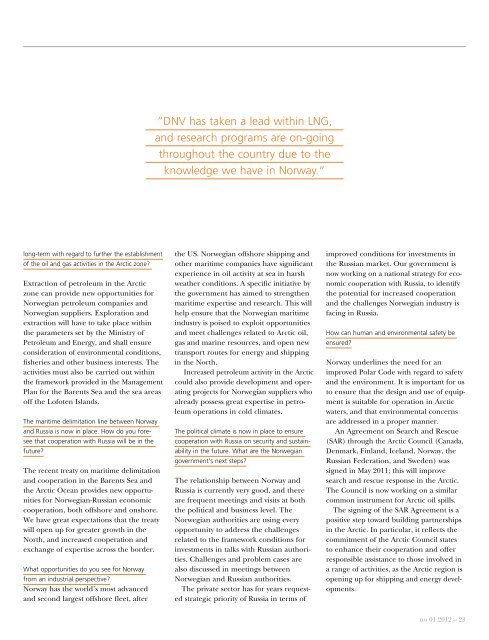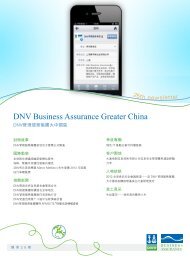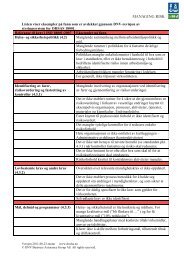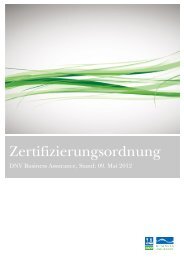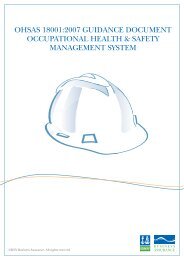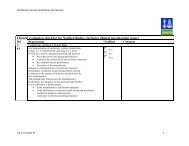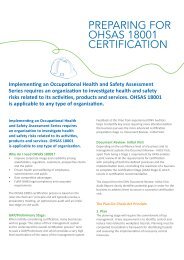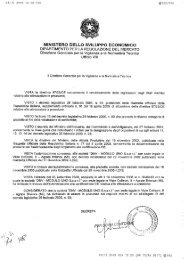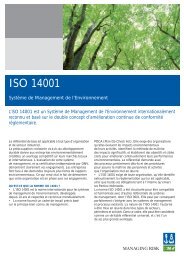Download - DNV Business Assurance
Download - DNV Business Assurance
Download - DNV Business Assurance
You also want an ePaper? Increase the reach of your titles
YUMPU automatically turns print PDFs into web optimized ePapers that Google loves.
“<strong>DNV</strong> has taken a lead within LNG,<br />
and research programs are on-going<br />
throughout the country due to the<br />
knowledge we have in Norway.”<br />
long-term with regard to further the establishment<br />
of the oil and gas activities in the Arctic zone?<br />
Extraction of petroleum in the Arctic<br />
zone can provide new opportunities for<br />
Norwegian petroleum companies and<br />
Norwegian suppliers. Exploration and<br />
extraction will have to take place within<br />
the parameters set by the Ministry of<br />
Petroleum and Energy, and shall ensure<br />
consideration of environmental conditions,<br />
fisheries and other business interests. The<br />
activities must also be carried out within<br />
the framework provided in the Management<br />
Plan for the Barents Sea and the sea areas<br />
off the Lofoten Islands.<br />
The maritime delimitation line between Norway<br />
and Russia is now in place. How do you foresee<br />
that cooperation with Russia will be in the<br />
future?<br />
The recent treaty on maritime delimitation<br />
and cooperation in the Barents Sea and<br />
the Arctic Ocean provides new opportunities<br />
for Norwegian-Russian economic<br />
cooperation, both offshore and onshore.<br />
We have great expectations that the treaty<br />
will open up for greater growth in the<br />
North, and increased cooperation and<br />
exchange of expertise across the border.<br />
What opportunities do you see for Norway<br />
from an industrial perspective?<br />
Norway has the world’s most advanced<br />
and second largest offshore fleet, after<br />
the US. Norwegian offshore shipping and<br />
other maritime companies have significant<br />
experience in oil activity at sea in harsh<br />
weather conditions. A specific initiative by<br />
the government has aimed to strengthen<br />
maritime expertise and research. This will<br />
help ensure that the Norwegian maritime<br />
industry is poised to exploit opportunities<br />
and meet challenges related to Arctic oil,<br />
gas and marine resources, and open new<br />
transport routes for energy and shipping<br />
in the North.<br />
Increased petroleum activity in the Arctic<br />
could also provide development and operating<br />
projects for Norwegian suppliers who<br />
already possess great expertise in petroleum<br />
operations in cold climates.<br />
The political climate is now in place to ensure<br />
cooperation with Russia on security and sustainability<br />
in the future. What are the Norwegian<br />
government’s next steps?<br />
The relationship between Norway and<br />
Russia is currently very good, and there<br />
are frequent meetings and visits at both<br />
the political and business level. The<br />
Norwegian authorities are using every<br />
opportunity to address the challenges<br />
related to the framework conditions for<br />
investments in talks with Russian authorities.<br />
Challenges and problem cases are<br />
also discussed in meetings between<br />
Norwegian and Russian authorities.<br />
The private sector has for years requested<br />
strategic priority of Russia in terms of<br />
improved conditions for investments in<br />
the Russian market. Our government is<br />
now working on a national strategy for economic<br />
cooperation with Russia, to identify<br />
the potential for increased cooperation<br />
and the challenges Norwegian industry is<br />
facing in Russia.<br />
How can human and environmental safety be<br />
ensured?<br />
Norway underlines the need for an<br />
improved Polar Code with regard to safety<br />
and the environment. It is important for us<br />
to ensure that the design and use of equipment<br />
is suitable for operation in Arctic<br />
waters, and that environmental concerns<br />
are addressed in a proper manner.<br />
An Agreement on Search and Rescue<br />
(SAR) through the Arctic Council (Canada,<br />
Denmark, Finland, Iceland, Norway, the<br />
Russian Federation, and Sweden) was<br />
signed in May 2011; this will improve<br />
search and rescue response in the Arctic.<br />
The Council is now working on a similar<br />
common instrument for Arctic oil spills.<br />
The signing of the SAR Agreement is a<br />
positive step toward building partnerships<br />
in the Arctic. In particular, it reflects the<br />
commitment of the Arctic Council states<br />
to enhance their cooperation and offer<br />
responsible assistance to those involved in<br />
a range of activities, as the Arctic region is<br />
opening up for shipping and energy developments.<br />
no 01 2012 – 23


